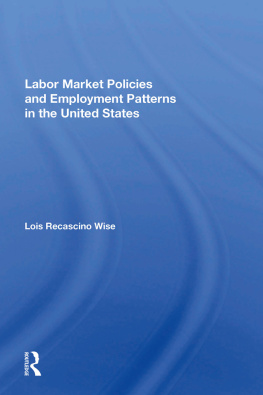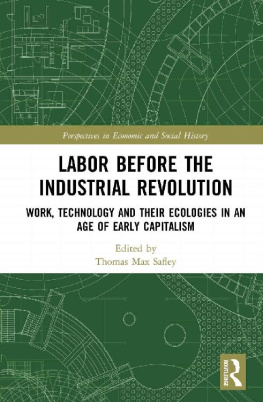Industrial Labor on the Margins of Capitalism
Max Planck Studies in Anthropology and Economy
Series editors:
Stephen Gudeman, University of Minnesota
Chris Hann, Max Planck Institute for Social Anthropology
Definitions of economy and society, and their proper relationship to each other, have been the perennial concerns of social philosophers. In the early decades of the twenty-first century these became and remain matters of urgent political debate. At the forefront of this series are the approaches to these connections by anthropologists, whose explorations of the local ideas and institutions underpinning social and economic relations illuminate large fields ignored in other disciplines.
Volume 1
Economy and Ritual:
Six Studies of Postsocialist Transformations
Edited by Stephen Gudeman and Chris Hann
Volume 2
Oikos and Market:
Explorations in Self-Sufficiency after Socialism
Edited by Stephen Gudeman and Chris Hann
Volume 3
When Things Become Property:
Land Reform, Authority, and Value in Postsocialist Europe and Asia
Thomas Sikor, Stefan Dorondel, Johannes Stahl and Phuc Xuan To
Volume 4
Industrial Labor on the Margins of Capitalism:
Precarity, Class, and the Neoliberal Subject
Edited by Chris Hann and Jonathan Parry
Industrial Labor on the Margins of Capitalism
Precarity, Class, and the Neoliberal Subject

Edited by
C HRIS H ANN AND J ONATHAN P ARRY

First published in 2018 by
Berghahn Books
www.berghahnbooks.com
2018 Chris Hann and Jonathan Parry
All rights reserved. Except for the quotation of short passages
for the purposes of criticism and review, no part of this book
may be reproduced in any form or by any means, electronic or
mechanical, including photocopying, recording, or any information
storage and retrieval system now known or to be invented,
without written permission of the publisher.
Library of Congress Cataloging-in-Publication Data
A C.I.P. cataloging record is available from the Library of Congress
British Library Cataloguing in Publication Data
A catalogue record for this book is available from the British Library
978-1-78533-678-2 hardback
978-1-78533-679-9 ebook
 Contents
ContentsChris Hann
Jonathan Parry
Ching Kwan Lee
Eeva Keskla
Tommaso Trevisani
Dimitra Kofti
Christian Strmpell
Daromir Rudnyckyj
Dina Makram-Ebeid
Elisabeth Schober
Andrew Sanchez
Jeremy Morris and Sarah Hinz
I-Chieh Fang
Rebecca Prentice
Grace Carswell and Geert De Neve
Michael Peter Hoffmann
Michael Burawoy
 Illustrations
IllustrationsFigures
Tables
11.1 Staff
workers and employees at KS1
 Preface
PrefaceC HRIS H ANN
Industrial methods of production have transformed the planet in the last two centuries and continue to do so. But is the social theory produced in those world regions where the transformations began sufficient to grasp the global industrialization of the twenty-first century? The concept of class, as exemplified by the urban proletariat, has always been contested. Is the Marxist definition still analytically helpful? If not, can the concept be constructively reformulated? Does the concept of precariat (Standing 2011) usefully supplement Marxs proletariat? Does it denote a separate social class? Can class express a powerful subjective identity? If not, what other factors shape the collective identities and personhood of industrial workers? These are just a few of the questions explored in this book.
The second world of socialism was a monumental effort to organize industrial society along lines radically different from those of the prototype in the capitalist West. The realities seldom lived up to the ideals of Marxist-Leninist-Maoist ideology. From Lenins enthusiastic espousal of Taylorist managerial philosophy to more subtle patterns of mutual influence during the decades of the Cold War, East converged with West in certain respects (Bockman 2011). But factory organization and incentive structures for both managers and workers continued to diverge from capitalist prototypes in significant ways. In Eastern Europe, for example, a high proportion of factory workers commuted throughout their working lives from villages, where they continued to cultivate small plots. Thus they participated simultaneously in agricultural and industrial divisions of labor. This was less common in the Soviet Union and East Germany, but here too evidence shows that no matter how alienating the factory work process, industrial relations and workers social life outside the factory differed significantly from what sociologists documented for the West. It is unsurprising that researchers have recently identified a sense of loss and even nostalgia about the era in which jobs were secure and membership in a socialist brigade brought emotional satisfaction that is hard to find today (Mller 2007).
By the end of the twentieth century this experiment was at an endeven in a few large states in East Asia that still claimed to be socialist. Instead of comparing the second world to the first, social scientists realized that many postsocialist states had much in common with the states of the Global South (a label that is beginning to look as inadequate as the earlier notion of a third world). Now, in the era of neoliberalism, some observers argue that the logic of capitalist class struggle results in global processes of dispossession and the polarization of societies (Harvey 2005). Others, however, detect more positive trends: for the first time since the original industrial revolution, massive regional shifts and the rise of new middle classes may be contributing to a reduction in global social inequality (Milanovic 2015). The statistical calculations supporting these analyses are controversial; scholarly positions tend to correlate with political and ideological standpoints, most notably concerning the market.
In order to move beyond ideologies and develop better theories of where human society is headed, it is necessary to have empirical data. This volume presents the results of field research, primarily ethnography. No other method gives comparable insight into lifeworldsin this case, the worlds of industrial workers at their workplaces, but also in their domestic settings (which occasionally coincide with the locus of production), and with careful attention to their age and gender, to rural backgrounds and migration histories, to ethnicity and caste, and so forth. When persons whose incomes and degrees of job security vary greatly are found to be living alongside each other, and even within the same household, their patterns of interaction have implications that are unlikely to emerge from published statistics or from formal interviews with individual employees.
Next page








